8 Talking About the Past
Throughout our journey thus far, we have talked in the present and the future; now it’s time for us to cross over into the past. You can think of the passé composé as a two-part tense, containing an auxiliary verb and a past participle. With this, you’ll finally be able to tell your friends what you did over the holiday
Everyday Chores
Doing chores, taxing though it may be, is unavoidable. It keeps us going and help us to stay organized throughout the day, even if it’s boring at times. Still, let’s tackle this chore and learn about everyday tasks in French.
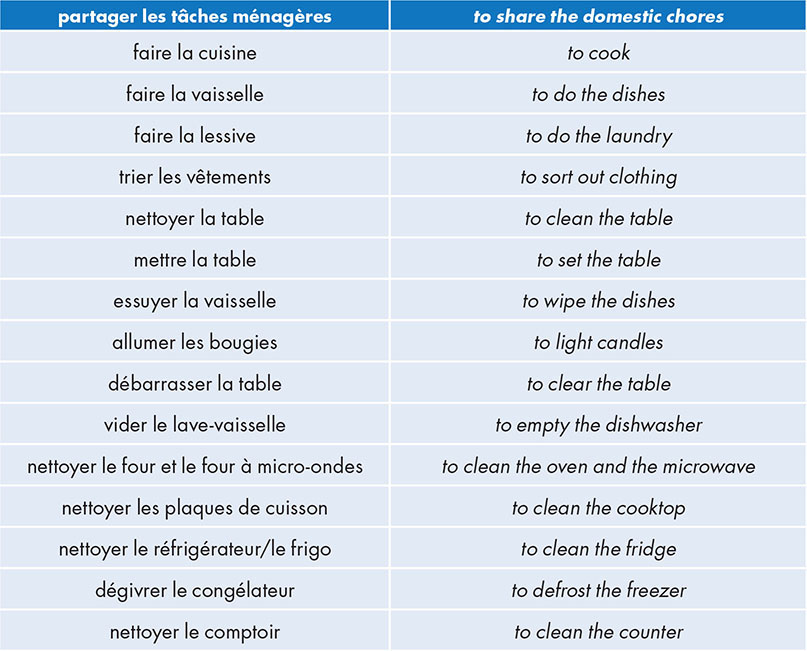
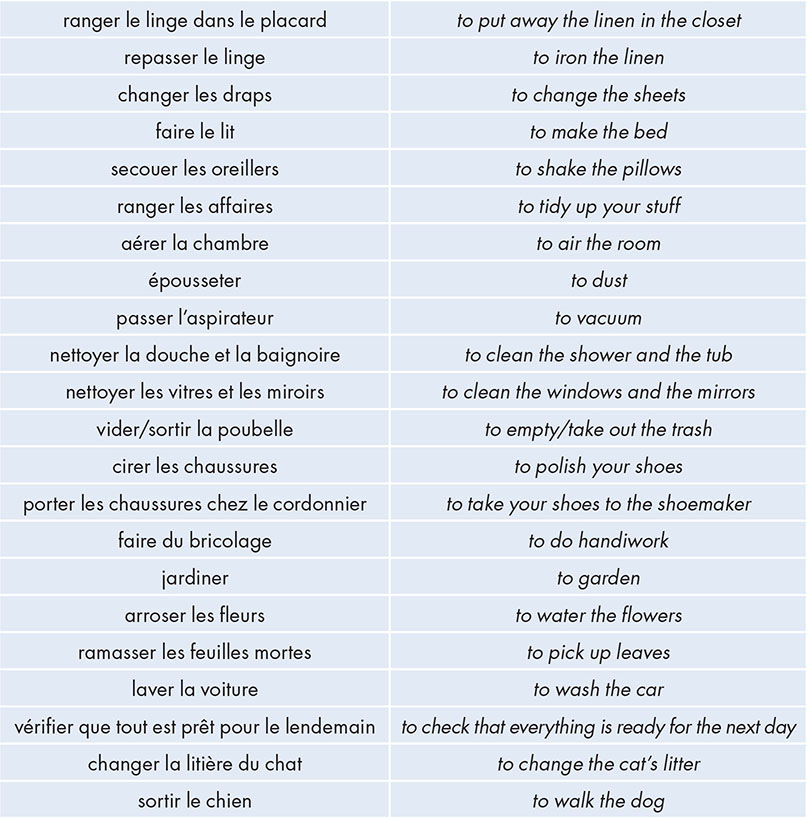
The Passé Composé
There are several tenses that are used in French when referring to the past. For now, we will focus on the passé composé, the most commonly used past tense. It refers to a single action in the past, and it is composed of two parts: an auxiliary verb (avoir or être) and a past participle.
This past participle is formed by adding an ending to the stem of the verb. Regular past participles are paired with the following endings:

The Passé Composé of -er Verbs Using Avoir
Most verbs in the passé composé are conjugated with avoir. Let’s first review the verb.
avoir:

Generally, when avoir is used with the passé composé, the past participle agrees neither in gender nor in number with the verb’s subject. Let’s take a look at the passé composé of commencer using avoir.
commencer to start/begin



When using the passé composé in the negative form, the ne and pas directly surround the auxiliary verb (avoir or être).

Similar to questions in the present tense, there are three ways to form a question using the passé composé.

Using inversion in the third person with the passé composé might seem daunting, though it, too, follows these rules.

The Passé Composé of -ir and -re Verbs Using Avoir
Similarly, the past participle of regular -ir and -re verbs is formed by attaching the appropriate endings.

Note that when avoir is used, the past participle agrees with the direct object only when it precedes the verb.

In the negative form, the ne is placed in front of avoir or être and the pas after avoir or être.

Like in the present tense, there are three ways to make a question.

Irregular Past Participles
Many verbs conjugated with avoir in the passé composé have irregular past participles that you simply have to learn by heart.

Here is a list of common irregular past participles:
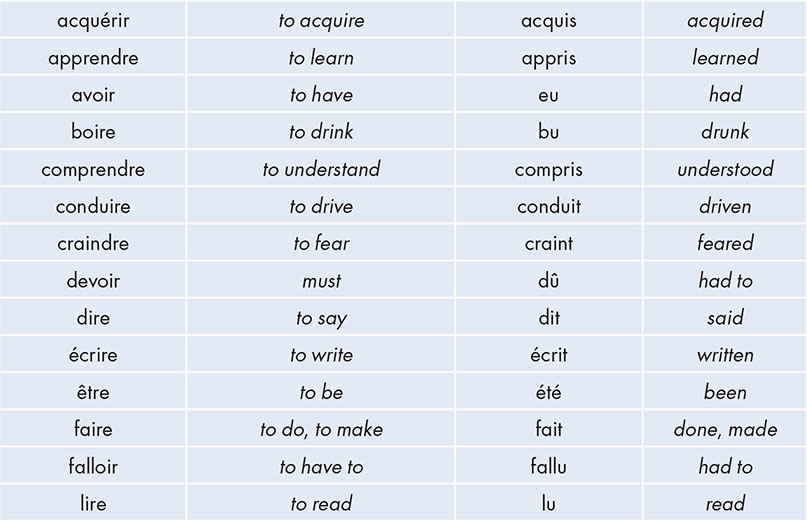
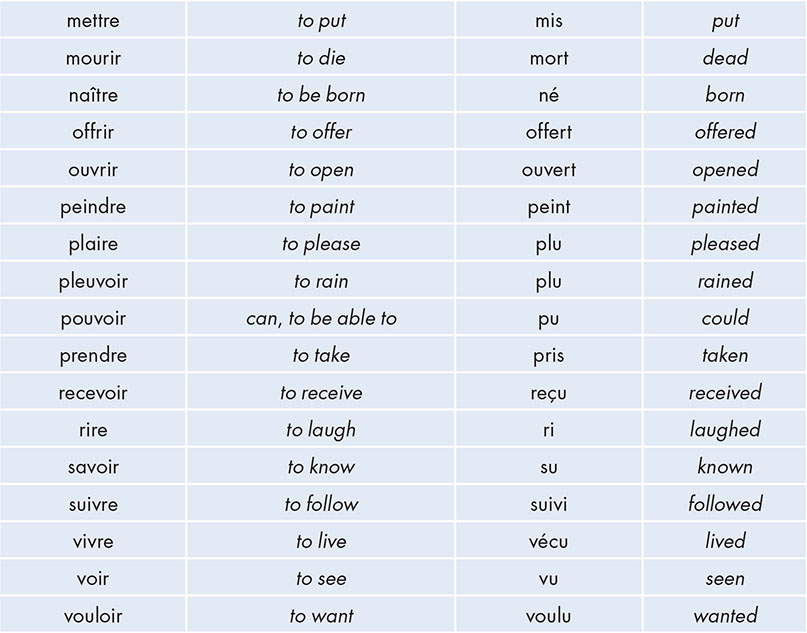

The Passé Composé with Être
Some verbs use être instead of avoir in the passé composé. Most importantly, you should memorize the list of verbs that are arbitrarily conjugated using être. But thankfully, all the pronominal verbs (see Chapter 7) are conjugated with être.
The past participle of the verb conjugated with être agrees in gender and number with the subject.

Here are some verbs conjugated with être in the passé composé:
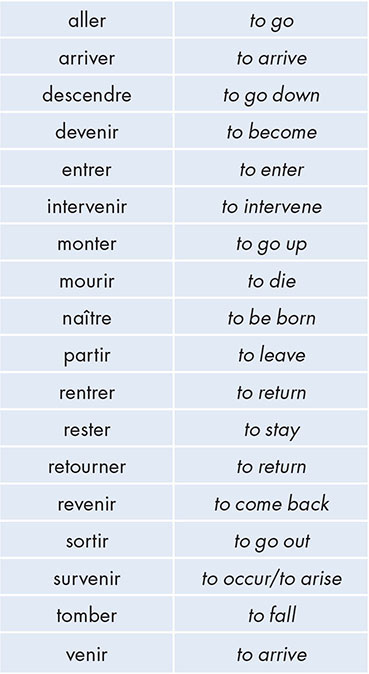


Using Adverbs with the Passé Composé
In the passé composé, adverbs of quantity, quality, and frequency are placed between avoir or être and the past participle.
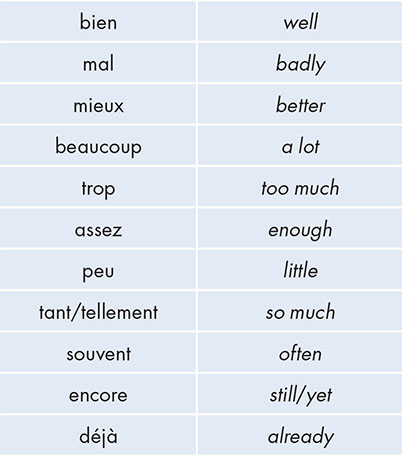
When using this grammar construction in the negative, the adverb is placed between ne and pas.

To express time with the passé composé, pendant (for, during) is commonly used, although it can be omitted. The golden rule to remember is that pour (for) is never used in the past. Let’s take a look at some sentences that carry the same meaning.

Pronominal Verbs in the Passé Composé
As we mentioned earlier, all pronominal verbs are conjugated with être. In this case, the reflexive pronoun precedes the auxiliary verb. And most of the time, the past participle agrees in gender and number with the subject.
se lever (to get up)


In the negative, the negation is placed around the auxiliary verb être.

In the interrogative form, the reflexive pronoun is placed before être.
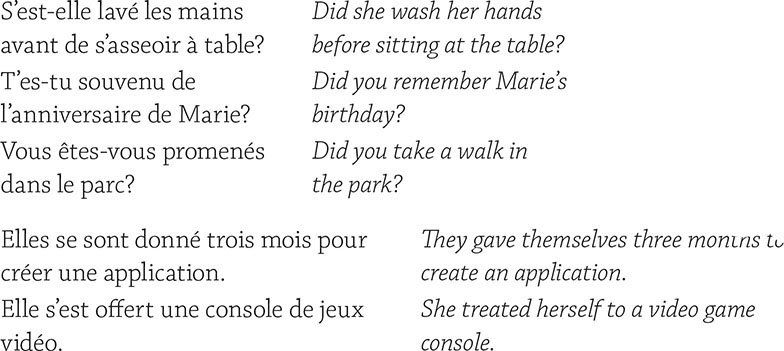
When reciprocal verbs take a direct object, the past participle agrees.

When reciprocal verbs take an indirect object, the past participle does not agree.

Versatile Verbs
Six versatile verbs can use either avoir or être in the passé composé: sortir, rentrer, monter, descendre, passer, and retourner. As we will see, depending on whether avoir or être is used, the meaning changes.


Note here that les meubles is the direct object, so avoir is used.

Note here that la journée is the direct object, so avoir is used.

Note here that une armoire is the direct object, so avoir is used.

Note here that les marches is the direct object, so avoir is used.

Note that la crêpe is the direct object so avoir is used.
Parts of the Home
Let’s take a tour of the house.

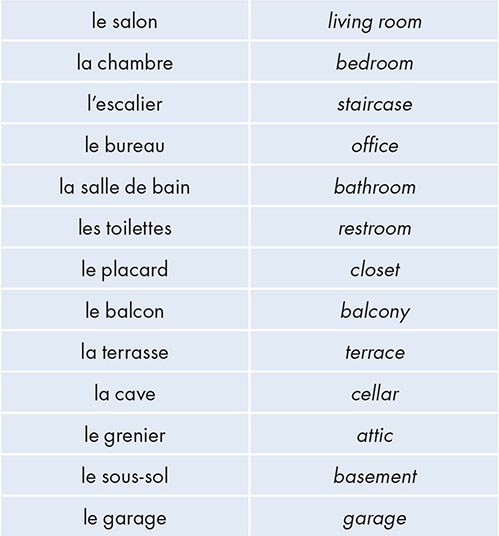
Since, For, and Ago
Like in English, when talking about time, we often use to these complex grammar constructions: since, for, and ago. Because it’s easy to conflate them, proceed with caution!
Since
The word since can be translated as depuis in French. In its simplest form, it can refer to an ongoing condition from a specific day, month, or year. While in English we use the word since with the past tense, in French it is used with the present tense.

When expressing how a specific event changes an ongoing state of affairs, the depuis que and depuis quand are used.

For
When expressing the duration of an ongoing action, you have several options: depuis, depuis combien de temps, il y a... que, and cela (ça) fait... que. Note that all of these options use a length of time to modify the ongoing action. Most importantly, French uses the present tense, whereas English uses the past tense.
Let’s begin with depuis. To ask a question about the duration of an action, use depuis quand (since when) or depuis combien de temps (how long). The grammar construction is different, but the meaning is the same.


Still, there is an important exception with negative sentences, where the passé composé is used instead of the present. Let’s take a look.

Ago
To specify how long ago something was done, use il y a followed by a length of time.

 DIALOGUE Télétravailler et coder en ligne Teleworking and coding online
DIALOGUE Télétravailler et coder en ligne Teleworking and coding online
Marie tells her friend Clara she is now working from home, juggling work and domestic chores while enjoying her online coding course.
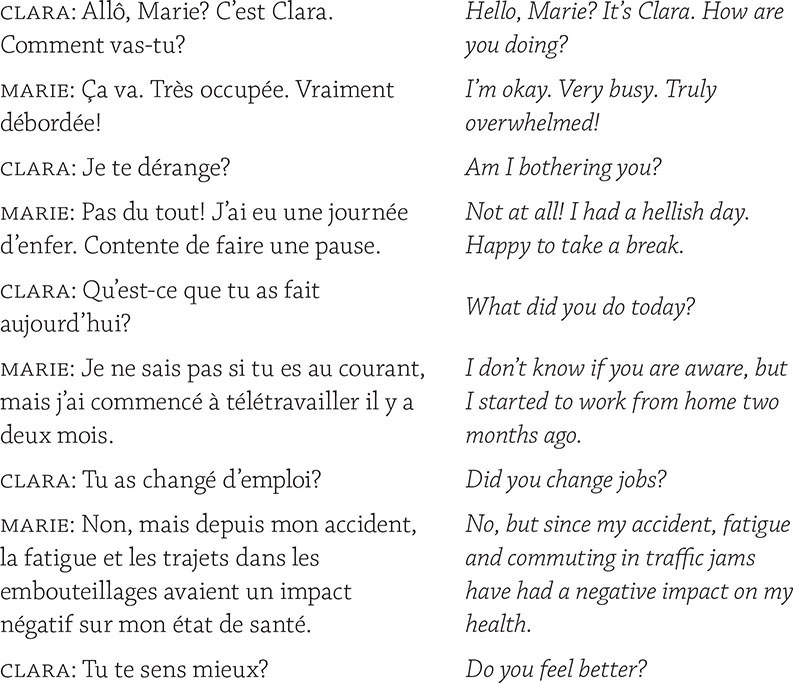
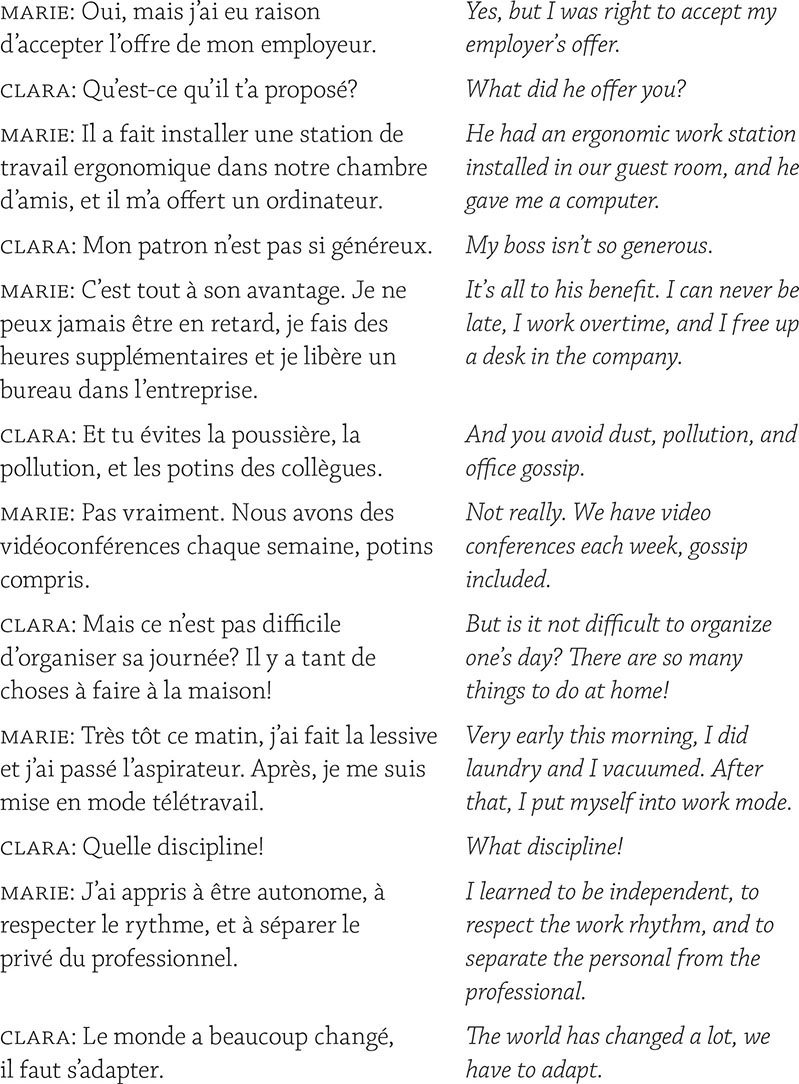
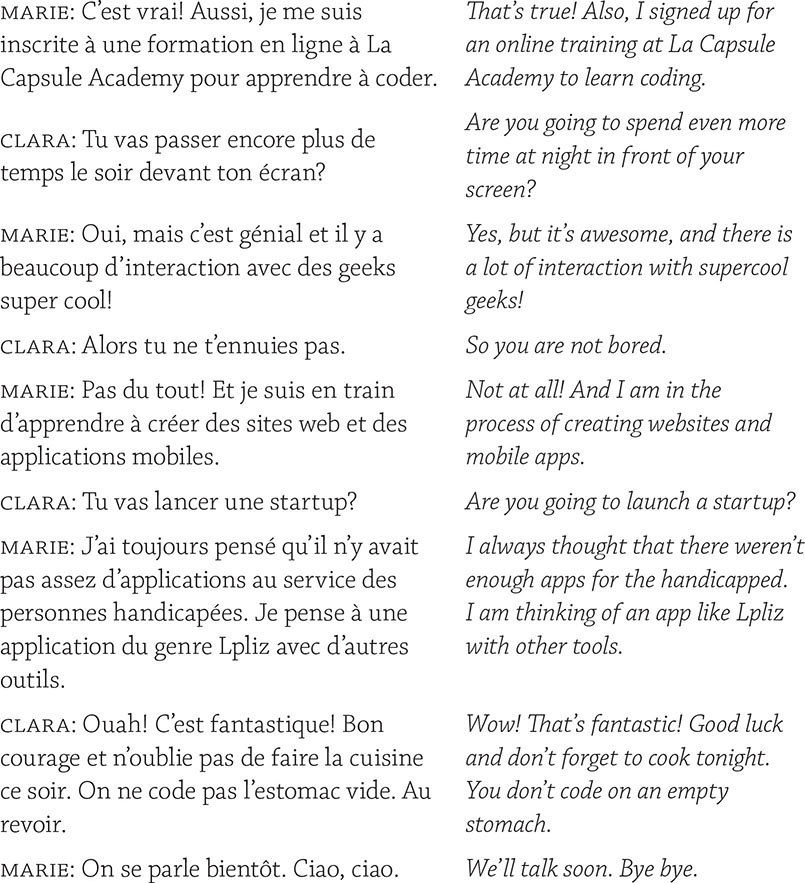
EXERCISES
EXERCISE 8.1
Conjugate the following -er verbs using the passé composé.
1. Il (passer) _______________ l’aspirateur dans la chambre.
2. Nous (nettoyer) _______________ la table du salon.
3. Elle (repasser) _______________ sa robe blanche.
4. Vous (ranger) _______________ les livres de cuisine.
5. Tu (débarrasser) _______________ la table.
6. Il (vider) _______________ la poubelle.
7. Je (cirer) _______________ mes chaussures.
8. Il (demander) _______________ une augmentation.
9. Nous (arroser) _______________ les fleurs du jardin.
10. Elles (vérifier) _______________ le thermostat.
EXERCISE 8.2
Conjugate the following verbs in the passé composé.
1. Ils (investir) _______________ en Europe.
2. Nous (attendre) _______________ André sur le quai de la gare.
3. Elle (choisir) _______________ de télétravailler.
4. L’autobus (ralentir) _______________ au croisement.
5. Vous (réussir) _______________ à l’examen.
6. Nous (applaudir) _______________ l’acrobate.
7. Je (perdre) _______________ une boucle d’oreille.
8. Tu (agrandir) la photo de tes vacances.
9. Je (sentir) _______________ une présence étrange.
10. Elles (faire) _______________ la vaisselle.
EXERCISE 8.3
Translate the following sentences using the tu form when applicable. When asking a question, use the est-ce que form.
1. Did you cook last night?
2. He ironed his shirt and polished his shoes.
3. We did the laundry on Sunday morning.
4. Who emptied the dishwasher?
5. He cleaned the refrigerator.
6. I sorted out my summer clothes.
7. We did not do the dishes last night.
8. You did not wipe all the tables.
9. Did you vacuum the bedroom?
10. She set the table and lit the candles.
EXERCISE 8.4
Conjugate the following verbs in the passé composé.
1. Il (voir) _______________ la liste des corvées domestiques et il (paniquer) _______________.
2. Nous (suivre) _______________ une formation informatique en ligne.
3. Tu (lire) _______________ l’ordonnance « Macron » sur le télétravail.
4. L’employeur (mettre) _______________ en place un bon système de télétravail.
5. Il (falloir) _______________ s’ajuster à ce nouveau rythme de travail.
6. Il (recevoir) _______________ un équipement adapté à son handicap.
7. Nous (vivre) _______________ une expérience extraordinaire.
8. Vous (acquérir) _______________ des compétences en informatique.
9. Il (repeindre) _______________ son bureau en bleu.
10. Je lui (offrir) _______________ un disque dur externe.
EXERCISE 8.5
Match the items in the two columns. Choose the most logical answer.
EXERCISE 8.6
Conjugate the following verbs in the passé composé.
1. Diane, dans quelle ville _______________ -vous (naître) _______________?
2. L’enfant (tomber) _______________ dans la cour de récréation.
3. Je (partir) _______________ de chez moi à huit heures ce matin.
4. Toi et tes amis, vous (rentrer) _______________ très tard.
5. Elles (rester) _______________ une heure de plus.
6. Il (descendre) _______________ du train.
7. Elle (devenir) _______________ codeuse pour un studio d’animation.
8. Lise (monter) _______________ dans l’avion.
9. Quel personnage de la série (mourir) _______________ en premier?
10. Jeanne et moi, nous (aller) _______________ au Salon des métiers du numérique à Lille.
EXERCISE 8.7
Rewrite the following sentences using the passé composé. Be careful with the position of the adverb.
1. L’enfant timide parle peu.
2. Nous dormons bien.
3. Elle téléphone souvent à sa collègue Patrice.
4. Vous ne mangez pas assez.
5. Ils dépensent trop dans le magasin d’électronique.
6. Il écrit bien le scénario.
7. Je m’exprime mal.
8. Il ment toujours.
9. Nous vivons mal cette expérience.
10. Je vais souvent au Bénin.
EXERCISE 8.8
Translate the following sentences using the tu form when applicable. When asking a question, use the est-ce que form.
1. He got off the train and he saw his parents on the platform.
2. I walked for an hour, then I drank two glasses of water.
3. René, did you go out this weekend?
4. She went to the animation studio.
5. We took the train from Paris to Lille.
6. Marie received a new computer.
7. They spent a lot of money during their vacation.
8. Sophie, at what time did you come back last night?
9. I already washed the dishes!
10. He waited for an hour, then he left.
EXERCISE 8.9
Conjugate the following verbs in the passé composé. Watch out for the agreement of the past participle.
1. Marie (se promener) _______________ dans le jardin botanique.
2. Ils (ne pas s’écrire) _______________ pendant des années.
3. Marie (se faire) _______________ faire une nouvelle robe pour les fiançailles de Clara.
4. Marie et Carla (se rencontrer) _______________ dans leur entreprise.
5. Mona (s’asseoir) _______________ dans une chaise ergonomique.
6. Paul (ne pas se souvenir) _______________ de l’heure du rendez-vous.
7. Ils (s’embrasser) _______________ dans le parc.
8. Nora et Fiona (ne pas s’habituer) _______________ au rythme de travail.
9. Est-ce qu’elles (se parler) _______________ ce matin?
10. Elle (s’offrir) _______________ une moto.
EXERCISE 8.10
Conjugate the following verbs in the passé composé.
1. Le crêpier (retourner) _______________ les crêpes avec beaucoup d’agilité.
2. Marie (passer) _______________ un examen pour obtenir son certificat.
3. Ashley (monter) _______________ en haut de la tour Eiffel.
4. Pourquoi est-ce qu’elle (retourner) _______________ en Alaska sans Victor?
5. Nous (passer) _______________ devant le Panthéon.
6. Est-ce que tu (rentrer) _______________ la voiture? Il va neiger.
7. Édouard (sortir) _______________ de chez lui en courant.
8. Raoul (monter) _______________ par l’escalier. Moi, j’ai pris l’ascenseur.
9. Je (descendre) _______________ les poubelles dans la rue. Quelle corvée!
10. Qui (sortir) _______________ le chien ce matin?
EXERCISE 8.11
Match the items in the two columns. Choose the most logical answer.
EXERCISE 8.12
Translate the following sentences using the tu form when applicable. When asking a question, use inversion.
1. We went to Henri’s on Friday night.
2. Jonathan remembered his appointment with Mr. Rufin.
3. She did not get used to her new job in Paris.
4. Did you bring the bicycle in?
5. They had a house built in Sicily.
6. Yves did not rest before his exam.
7. They called each other almost every day.
8. Benoît and Alexandra, where did you meet?
9. She passed by Lyon to go to Menton.
10. Why didn’t you take the dog out this morning?
EXERCISE 8.13
Match the items in the two columns. Choose the most logical answer.
EXERCISE 8.14
Translate the phrases in parentheses.
1. (Since when) _______________ connais-tu Pierre? —Je connais Pierre depuis 2015.
2. (How long) _______________ est-ce que tu travailles pour eux? —Depuis quatre ans.
3. (Since when) _______________ sont-elles amies? —Elles sont amies depuis leur enfance.
4. (Since when) _______________ est-ce qu’il repasse ses chemises? —Depuis qu’il travaille chez Airbus.
5. (How long) _______________ est-ce qu’elle arrose les fleurs? —Depuis vingt minutes.
6. (How long) _______________ est-ce que Balzac est mort? —Depuis plus d’un siècle et demi.
7. (Since when) _______________ habitent-ils à Reims? —Ils habitent à Reims depuis qu’ils sont mariés.
8. (How long) _______________ avez-vous pris votre retraite? —Depuis huit mois.
9. (How long) _______________ Mathéo anime-t-il ses ateliers? —Il anime ses ateliers depuis trois ans.
10. (Since when) _______________ Camélia est-elle la principale? —Depuis
2017.
EXERCISE 8.15
Rewrite the following sentences using Cela fait… que instead of depuis.
1. Il pleut sans cesse depuis deux heures.
2. J’ai cette chaise ergonomique depuis un mois.
3. Ils sont autonomes depuis plusieurs années.
4. La repasseuse repasse le linge depuis une heure.
5. Elle écrit ses mémoires depuis des années.
6. Clara et Marie se parlent depuis une heure et demie.
7. Nous conduisons sur l’A7 depuis des heures.
8. On boit du thé vert depuis un certain temps.
9. Vous suivez un cours en ligne depuis trois ans.
10. Il fait du judo depuis un an.
EXERCISE 8.16
Following the model, reconstruct the following sentences.
Charles/regarder la série/trente minutes. → Charles regarde la série depuis trente minutes.
1. Nous/connaître Marie/longtemps.
2. Il/lire ce livre de science-fiction/deux heures.
3. Vous/chercher un appartement/des mois.
4. Elle/dessiner/une demi-heure.
5. Ils/porter des vêtements vintage/les années 1980.
6. Nous/randonner dans la forêt/des heures.
7. Il/être amoureux de Sara/trois ans.
8. Elle/organiser ces fêtes/des années.
9. Il/ être le petit ami de Claire/un mois.
10. Tu/conduire malgré la tempête de neige/une heure.
EXERCISE 8.17
Translate the following sentences using the vous form when applicable. When asking a question, use inversion.
1. Since what year have you been working in this company?
2. They have been living in the 15th arrondissement forever.
3. I have not gone to Paris for three years.
4. How long have you been living in this apartment?
5. We have not seen our parents since December.
6. How long have you known Roland?
7. I have been waiting for you for half an hour!
8. Since when have you been eating quinoa?
9. She had been playing Phaedra for two months.
10. I have been studying Mandarin for two years.

LE COIN DES CRÉATEURS
LES LIEUX DU SOMMEIL
Imagine you spent the night in an unusual place. Describe the place and how you felt during the night, using as many passé composé constructions as possible.
Check these places you might consider in your dictionary: dans un train, sur un bateau, dans un arbre, dans un igloo, dans un champ, dans un monastère, sur une île, dans une maison sur pilotis, dans une caravane, sous la tente, dans une jarre, dans un musée, sur une gondole, etc. Select a place and write a short paragraph, following the example below:
La nuit dernière, j’ai dormi dans un hamac. J’ai trouvé ce hamac accroché à deux arbres au bord de la mer, et j’ai décidé de me reposer. Je me suis installé et j’ai commencé à rêver. Tout à coup j’ai entendu…
NOTE CULTURELLE
THE NEW WORK SPACE
Historically, “going to work” meant leaving the house and traveling to a specific location, a workplace or work site, where a job was performed for a specified time period. Once done with the day’s work, the employee left the workplace, only to return the next scheduled working day to repeat the process. While many people are still on a “9 to 5” work schedule, advances in technology and telecommunications have made it possible for many jobs to be performed elsewhere, either at home, during business travel, or in shared workplaces like WeWork. The new workplace is not always what it used to be. People working under these new arrangements are “teleworkers” (télétravailleurs), performing “telework” or “teleworking” (télétravail).
Teleworking is a worldwide phenomenon, and it has become increasingly popular in France. According to a study conducted in 2018 by the Institut Français d’Opinion Publique (IFOP), an international polling and market research firm, approximately 25 percent of French employees make use of teleworking. However, only 6 percent of those do so based on an employment contract. In order to provide legal structure and protection for all teleworkers and their employers, the French government has enacted legislation defining what it is and listing the obligations of both teleworking employees and their employers.
In France, Article L1222-9 of the Labor Code defines teleworking as “any manner of arranging work in which a job that could also be performed in the employer’s premises is done by an employee outside of those premises, on a voluntary basis, using information communications technologies.” This law was amended by a presidential order, known as an ordonnance, to cover teleworking done on a regular basis, as well as occasional or situational telework made necessary due to inclement weather, natural disaster, or special work assignments.
Both the order and the law emphasize the voluntary aspect of teleworking and the need for an agreement between the employee and employer authorizing it. Such an agreement may be made when an employee is hired, or introduced later. The location where the work is to be performed is not specified: it may be at home, at a remote location, while in transit, at a business center, or elsewhere. These agreements may be part of a collective bargaining agreement negotiated by a union or directly with the employer, or privately negotiated. However, teleworking is not an absolute right for an employee, and an employer can reject a request for such an arrangement provided it is based on solid legal grounds. And, with the exception of certain cases such as a health epidemic or natural disaster, when the employer’s premises cannot be accessed, an employee cannot be required to telework. It is important to remember that the teleworker has the same rights as the employee who performs his duties on the company’s premises.
The flexibility teleworking provides is definitely one of its major advantages. This can be particularly appealing for employees with disabilities who may have difficulty in accessing the employer’s premises. It allows them to adapt their working hours to accommodate their physical requirements and to schedule regular medical or rehabilitative treatments otherwise impossible during the “normal” workday. For those with mobility problems, it also reduces or even eliminates travel time and the stress and fatigue that often accompany a daily commute. If adaptation of the disabled employee’s work premises is needed, it is the responsibility of the employer. However, funds are available to assist both public- and private-sector employers in covering the cost. The law also applies to temporary teleworking, enabling employees with temporary disabilities to adjust their work schedules according to their physical condition.
Teleworking has many advantages for employees and employers alike, and for the most part, it is a win-win concept, but it is not perfect. For the employer, there is the missed opportunity of constant interaction with staff. There is also a need to be mindful at all times of the laws governing teleworking, so that the rights of teleworkers are not violated and they are treated the same way as regular employees.
For the teleworker, working off-site requires discipline, particularly when it is at home. Schedules must be respected, and the amount of work produced and the number of working hours must be the same as if on the employer’s premises. Vigilance is also needed to maintain the separation between private and professional life. Finally, there is the issue of isolation and loneliness. An employee who works alone often misses out on the face-to-face interaction with colleagues that is so important for job satisfaction and success.
Teleworking is not “one-size-fits-all” and may not be for everyone, but the concept is appealing and is sure to become more widespread over time.
 KNOW
KNOW In the passé composé, the negation surrounds être or avoir.
In the passé composé, the negation surrounds être or avoir.



